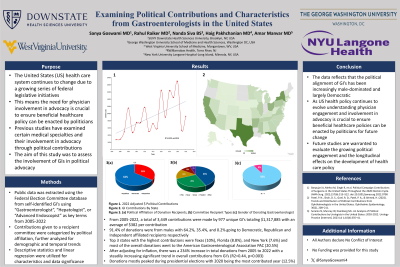Tuesday Poster Session
Category: Practice Management
P4912 - Examining Political Contributions and Characteristics From Gastroenterologists in the United States
Tuesday, October 29, 2024
10:30 AM - 4:00 PM ET
Location: Exhibit Hall E

Has Audio
- SG
Sanya Goswami, MD
SUNY Downstate Health Sciences University
Brooklyn, NY
Presenting Author(s)
Sanya Goswami, MD1, Rahul Raiker, MD2, Nanda Siva, MBA3, Haig Pakhchanian, MD4, Amar Manvar, MD5
1SUNY Downstate Health Sciences University, Brooklyn, NY; 2George Washington University School of Medicine and Health Sciences, Washington, DC; 3West Virginia University School of Medicine, Morgantown, WV; 4RWJ Barnabas Health Community Medical Center, Toms River, NJ; 5NYU Langone Health, Mineola, NY
Introduction: The United States (US) health care system continues to change due to a growing series of federal legislative initiatives. This means the need for physician involvement in advocacy is crucial to ensure beneficial healthcare policy can be enacted by politicians. Previous studies have examined certain medical specialties and their involvement in advocacy through political contributions. The aim was to assess the involvement of gastroenterologists (GIs) in political advocacy, as it has not been previously characterized in any study.
Methods: Public data was extracted using the Federal Election Committee database from self-identified GIs using “Gastroenterologist”, “Hepatologist”, or “Advanced Endoscopist” as key terms from 2005-2022. Those who were non-physicians were excluded. Contributions given to a recipient committee were categorized by political affiliation (Democratic, Independent, or Republican) and were further analyzed for demographic and temporal trends. Descriptive statistics and linear regression were utilized for characteristics and data significance.</strong>
Results: From 2005-2022, a total of 3,449 contributions were made by 977 unique GIs totaling $1,317,885 with an average of $382 per contribution. 91.4% of donations were from males with 64.2%, 35.4%, and 0.2% going to Democratic, Republican and Independent affiliated recipients respectively. The top 3 states with the highest contributions were Texas (10%), Florida (8.8%), and New York (7.6%) and most of the overall donations went to the American Gastroenterological Association Political Action Committee (20.5%). After adjusting for inflation, there was a 234% increase in total donations from 2005 to 2022 with a steadily increasing significant trend in overall contributions from GIs (R<span style="font-size: 0.6em; vertical-align: super;">2</span>=0.44, p=0.003). Donations mostly peaked during presidential elections with 2020 being the most contributed year (12.5%).
Discussion: The data reflects that the political alignment of GIs has been increasingly male-dominated and largely Democratic. As US health policy continues to evolve, understanding the importance of physician political advocacy and campaign contributions is pivotal for future change. Future studies are warranted to evaluate the growing political engagement and the longitudinal effects on the development of health care policy.
Disclosures:
Sanya Goswami, MD1, Rahul Raiker, MD2, Nanda Siva, MBA3, Haig Pakhchanian, MD4, Amar Manvar, MD5. P4912 - Examining Political Contributions and Characteristics From Gastroenterologists in the United States, ACG 2024 Annual Scientific Meeting Abstracts. Philadelphia, PA: American College of Gastroenterology.
1SUNY Downstate Health Sciences University, Brooklyn, NY; 2George Washington University School of Medicine and Health Sciences, Washington, DC; 3West Virginia University School of Medicine, Morgantown, WV; 4RWJ Barnabas Health Community Medical Center, Toms River, NJ; 5NYU Langone Health, Mineola, NY
Introduction: The United States (US) health care system continues to change due to a growing series of federal legislative initiatives. This means the need for physician involvement in advocacy is crucial to ensure beneficial healthcare policy can be enacted by politicians. Previous studies have examined certain medical specialties and their involvement in advocacy through political contributions. The aim was to assess the involvement of gastroenterologists (GIs) in political advocacy, as it has not been previously characterized in any study.
Methods: Public data was extracted using the Federal Election Committee database from self-identified GIs using “Gastroenterologist”, “Hepatologist”, or “Advanced Endoscopist” as key terms from 2005-2022. Those who were non-physicians were excluded. Contributions given to a recipient committee were categorized by political affiliation (Democratic, Independent, or Republican) and were further analyzed for demographic and temporal trends. Descriptive statistics and linear regression were utilized for characteristics and data significance.</strong>
Results: From 2005-2022, a total of 3,449 contributions were made by 977 unique GIs totaling $1,317,885 with an average of $382 per contribution. 91.4% of donations were from males with 64.2%, 35.4%, and 0.2% going to Democratic, Republican and Independent affiliated recipients respectively. The top 3 states with the highest contributions were Texas (10%), Florida (8.8%), and New York (7.6%) and most of the overall donations went to the American Gastroenterological Association Political Action Committee (20.5%). After adjusting for inflation, there was a 234% increase in total donations from 2005 to 2022 with a steadily increasing significant trend in overall contributions from GIs (R<span style="font-size: 0.6em; vertical-align: super;">2</span>=0.44, p=0.003). Donations mostly peaked during presidential elections with 2020 being the most contributed year (12.5%).
Discussion: The data reflects that the political alignment of GIs has been increasingly male-dominated and largely Democratic. As US health policy continues to evolve, understanding the importance of physician political advocacy and campaign contributions is pivotal for future change. Future studies are warranted to evaluate the growing political engagement and the longitudinal effects on the development of health care policy.
Disclosures:
Sanya Goswami indicated no relevant financial relationships.
Rahul Raiker indicated no relevant financial relationships.
Nanda Siva indicated no relevant financial relationships.
Haig Pakhchanian indicated no relevant financial relationships.
Amar Manvar indicated no relevant financial relationships.
Sanya Goswami, MD1, Rahul Raiker, MD2, Nanda Siva, MBA3, Haig Pakhchanian, MD4, Amar Manvar, MD5. P4912 - Examining Political Contributions and Characteristics From Gastroenterologists in the United States, ACG 2024 Annual Scientific Meeting Abstracts. Philadelphia, PA: American College of Gastroenterology.
